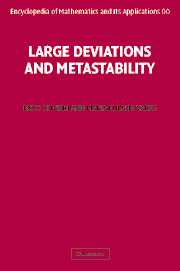Book contents
- Frontmatter
- Contents
- Preface
- 1 Large deviations: basic results
- 2 Small random perturbations of dynamical systems. Basic estimates of Freidlin and Wentzell
- 3 Large deviations and statistical mechanics
- 4 Metastability. General description. Curie–Weiss model. Contact process
- 5 Metastability. Models of Freidlin and Wentzell
- 6 Reversible Markov chains in the Freidlin–Wentzell regime
- 7 Metastable behaviour for lattice spin models at low temperature
- References
- Index
Preface
Published online by Cambridge University Press: 13 August 2009
- Frontmatter
- Contents
- Preface
- 1 Large deviations: basic results
- 2 Small random perturbations of dynamical systems. Basic estimates of Freidlin and Wentzell
- 3 Large deviations and statistical mechanics
- 4 Metastability. General description. Curie–Weiss model. Contact process
- 5 Metastability. Models of Freidlin and Wentzell
- 6 Reversible Markov chains in the Freidlin–Wentzell regime
- 7 Metastable behaviour for lattice spin models at low temperature
- References
- Index
Summary
This book has germinated from the lecture notes of a course ‘Large deviations and metastability’ given by one of us at the ‘CIMPA First School on Dynamical and Disordered Systems’, at Universidad de la Frontera, Temuco, during the summer of 1992 [293].
Since then a large amount of new material on metastability has been accumulated, and our goal was to combine a basic introduction to the theory of large deviations with a wide overview of the metastable behaviour of stochastic dynamics.
Typical examples of metastable states are supersaturated vapours and magnetic systems with magnetization opposite to the external field. Metastable behaviour is characterized by a long period of apparent equilibrium of a pure thermodynamic phase followed by an unexpected fast decay towards the stable equilibrium of a different pure phase or of a mixture, e.g. homogeneous nucleation of the liquid phase inside a highly supersaturated vapour, due to spontaneous density fluctuations. The point of view of metastability as a genuinely dynamical phenomenon is now widely accepted. Approaches which aim to describe static aspects of metastability (such as determination of the metastable branch of the equation of state of a fluid) in the Gibbs equilibrium set-up are, in their ‘naïve form’, applicable only in a mean field context. In this case, the physically unacceptable assumption that the range of the interaction equals the linear dimension of the container gives rise to pathological behaviour of non-convex free energy that implies negative compressibility, namely, thermodynamic instability.
Information
- Type
- Chapter
- Information
- Large Deviations and Metastability , pp. xi - xviPublisher: Cambridge University PressPrint publication year: 2005
